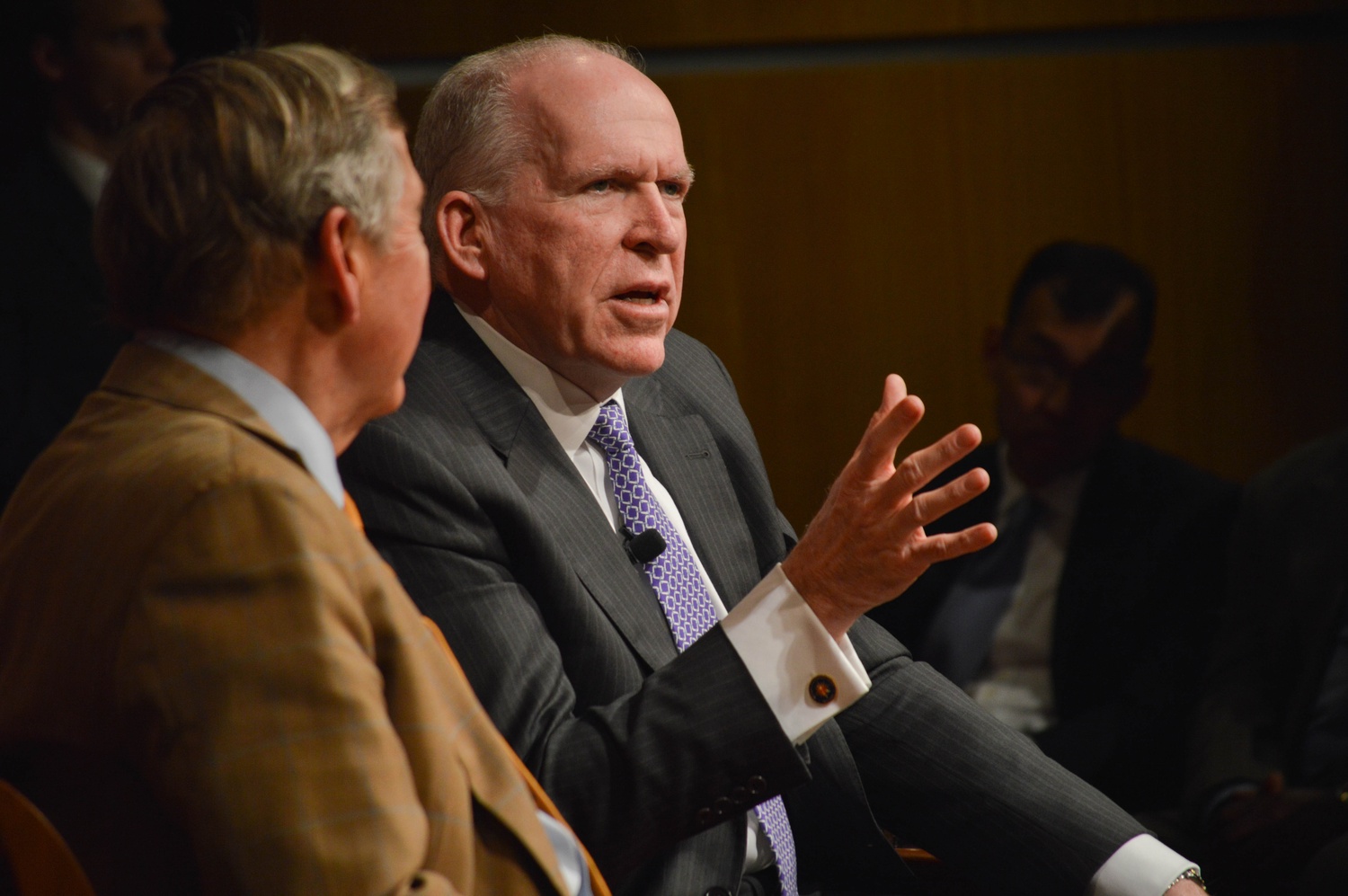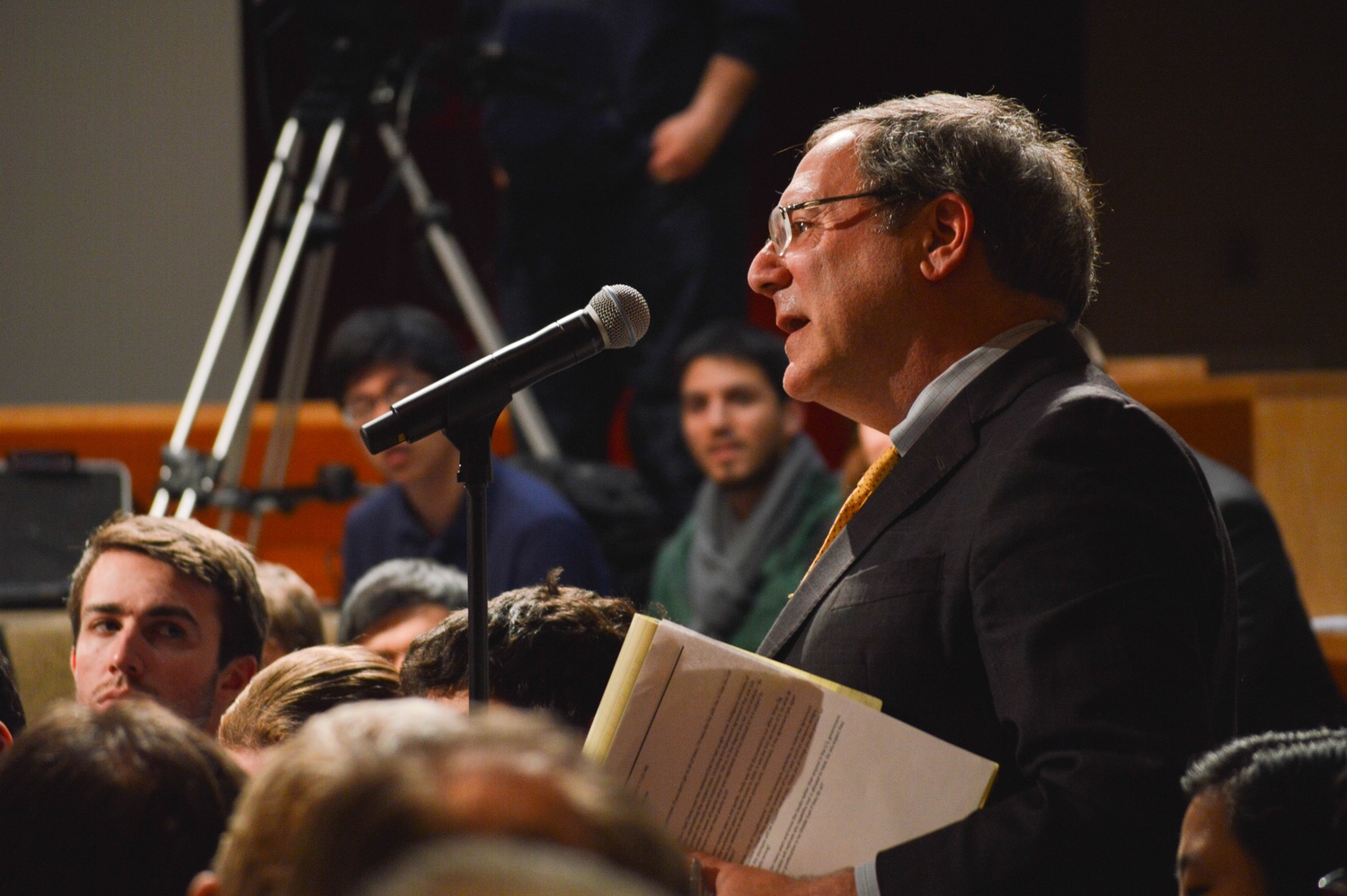
News
Harvard Grad Union Agrees To Bargain Without Ground Rules

News
Harvard Chabad Petitions to Change City Zoning Laws

News
Kestenbaum Files Opposition to Harvard’s Request for Documents

News
Harvard Agrees to a 1-Year $6 Million PILOT Agreement With the City of Cambridge

News
HUA Election Will Feature No Referenda or Survey Questions
CIA Director Discusses ISIS, Iranian Nuclear Negotiations

Central Intelligence Agency Director John O. Brennan spoke at the Institute of Politics on Tuesday about the ongoing Iranian nuclear negotiations and the challenges of combating radical militant groups like the Islamic State of Iraq and Syria.
The John F. Kennedy Jr. Forum event, moderated by Belfer Center Director and former Kennedy School Dean Graham T. Allison, comes a little more than two years after Brennan was sworn in as CIA Director in March 2013. Brennan had previously served as the U.S. Homeland Security Advisor under President Barack Obama and as interim director of the National Counterterrorism Center he helped establish.
Brennan expressed approval of the framework deal revealed last week on the future of the Iranian nuclear program, highlighting the new proposed inspection regimes and limits on enrichment as significant achievements.
“The individuals who say that this deal provides a pathway for Iran to a bomb are being wholly disingenuous in my view,” Brennan said. “If you look at…what it has done, preventing Iran, limiting Iran, for fifteen, twenty years in a variety of ways—I’m certainly pleasantly surprised that the Iranians have agreed to so much here.”
Brennan acknowledged, however, that Iran’s “track record of causing trouble in the region,” particularly “sponsoring different insurgencies,” warranted “carefully watch[ing]” the country regardless of the outcome of the nuclear negotiations.
When asked about ISIS, Brennan characterized the group as a force that many Middle Eastern governments, lacking sufficient military capabilities and institutions, are unable to challenge.
“Unquestionably, violence has become a way of life in these societies and cultures,” Brennan said. “The natural gravitational pull for people who are alienated with a lack of good governance, a lack of getting food and jobs, is to go to one of these groups that has as their raison d’être opposition to the central government.”
Brennan also said the U.S. counterterrorism effort was not in itself designed to resolve but rather provide time to resolve Middle Eastern tensions and crises.

“There’s no way that we can kill our way out of this challenge,” Brennan said. “We need to be able to stop those plots, those activities that threaten us as well as our partners and try to bring it down so that some of the political processes that need to take root can—that’s going to be a long and challenging road.”
Brennan also spoke about his ongoing effort to modernize the CIA and prepare it for a new age of asymmetric cyber warfare.
“The purpose behind this modernization effort is to make sure that CIA officers understand all of the arrows in our quiver, all of the things we can do that will be able to address our national security challenges,” Brennan said. “Different parts of the agency sometimes were separated from one another and compartmented and people didn’t have a full appreciation of some of the capabilities they could leverage.”
—Staff writer Luca F. Schroeder can be reached at luca.schroeder@thecrimson.com. Follow him on Twitter @lucaschroeder.
Want to keep up with breaking news? Subscribe to our email newsletter.
Related Articles
Most Read
- Harvard Dismisses Leaders of Center for Middle Eastern Studies
- Trump Administration To Review Billions in Federal Funding to Harvard
- Dean of Students Addresses Immigration Fears in College-wide Email
- More Than 80 HLS Professors Denounce Trump Admin Attacks on Law Firms in Letter to Students
- FAS Committee Recommends Overhauled Disciplinary Appeals Process, More Faculty on Ad Board
From Our Advertisers

Over 300+ courses at prestigious colleges and universities in the US and UK are at your disposal.

With innovative financial tools combined with financial education, Collegiate empowers students to take control of their finances and build confidence in their money management skills.

Serve as a proctor for Harvard Summer School (HSS) students, either in the Secondary School Program (SSP), General Program (GP), or Pre-College Program.

With an increasingly competitive Law School admissions process, it's important to understand what makes an applicant stand out.

Welcome to your one-stop gifting destination for men and women—it's like your neighborhood holiday shop, but way cooler.

Admit Expert is a premium MBA admissions consulting company, helping candidates secure admission to top B-schools across the globe with significant scholarships.
